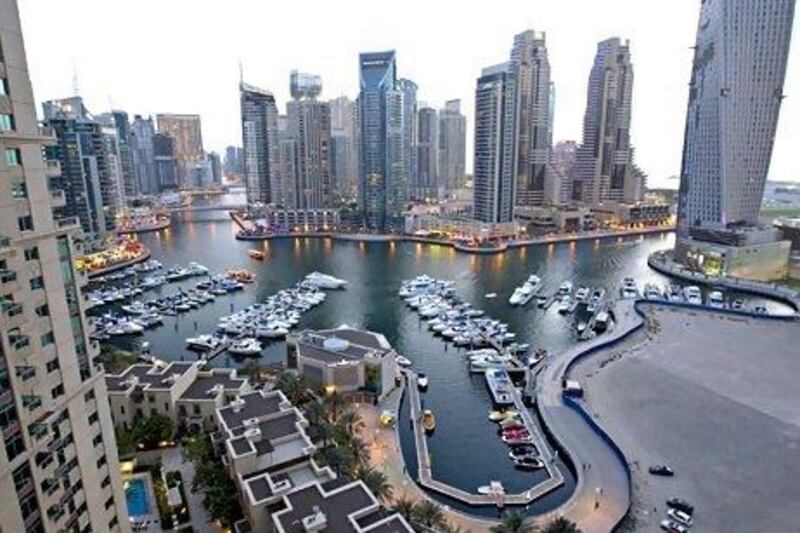Property buyers using mortgages will have to stump up more than twice as much out of their own pocket to make a down payment as a result of the Central Bank's new mortgage rules, new research found yesterday.
Buyers’ self-funding requirements will rise by 100 per cent for nationals and 150 per cent for expatriates, said Chiradeep Ghosh, an analyst at Securities and Investment Company (Sico), a Bahrain-based investment bank. Bankers are to meet tomorrow to formulate a response to the government circular. “We estimate 20 to 25 per cent of the property market is mortgage-funded, and these borrowers may face problems in arranging for the down payment,” said Mr Ghosh.
As an example, for a typical one-bedroom apartment in Downtown Dubai, an expat buyer’s funding requirements will rise by Dh350,000 (US$95,292) to Dh500,000, he estimated in a report.
The report comes as the property market gets to grips with mortgage regulations unveiled by the Central Bank on New Year’s Eve. In a circular to banks and other financial institutions, it told them to limit expat borrowing to 50 per cent of the value of the first house and 40 per cent for any further properties.
A retail banking committee of the Emirates Banks Association, a local industry body, is expected to discuss a range of proposals tomorrow to ease the burden of the new regulations, Dow Jones reported yesterday.
And Reuters reported yesterday that the Central Bank plans to issue broader mortgage regulations by the middle of this year.
"The final pieces of the new mortgage regulations are being put together. It could be ready for issue by June this year," a source told Reuters. Limits for mortgage lending to Emiratis were set at 70 per cent for the first house and 60 per cent after that.
Banks have scrambled to appeal against the decision, while property market observers have warned of its downside risks to the property market.
Jones Lang LaSalle, the property consultant, said last week the cap and the significant levels of new supply scheduled this year were “likely to limit price increases below the levels witnessed in 2012”.
The bigger down payment requirement would be likely to stall prospective buyers’ purchasing decisions, potentially dragging on market confidence, said Mr Ghosh.
“The effect is more likely to be sentimental, considering even cash buyers may also hold on for a bit longer to wait and see if the market goes down,” he said.
The previous lending limits of many banks are believed to be well short of the new caps, otherwise known as loan-to-value ratios. Most UAE banks were offering mortgage loans of up to 80 per cent of the property value for expats and 85 per cent for nationals, according to Sico. Given current property prices, loan-to-value ratios of 75 per cent for expats and 80 per cent for nationals would be reasonable, said Abdullah Al Otaiba, the senior general manager of domestic banking at National Bank of Abu Dhabi (NBAD).
NBAD is in discussions with the Central Bank as it seeks to get the limits eased. “They might be flexible [on the loan-to-value ratios]. We will have to see” said Mr Al Otaiba. “[As the rules stand] They will affect real estate and all the banks and developers.”
An appeal from the Emirates Banks Association, which represents lenders, requesting a 30-day extension to prepare for the rules had been turned down, he said. Banks are still assessing the extent of the effect of the rules on their earnings. Many are only recently recovering from the knock to their bottom lines caused by defaults on mortgage repayments and a property price crash during the post-2008 downturn.
Although the future mortgage lending of banks would be curtailed, the effect on their total lending portfolios will be minor, believes Sico. Retail mortgage lending makes up less than 10 per cent of most banks’ total loan portfolio, it estimates.
Retail and non-retail mortgage loans stood at Dh162 billion in August last year. In contrast, total lending has shot up from Dh1.04 trillion to Dh1.117tn over the same period. As a result, combined mortgage loans of total lending has eased from 16 per cent to 14.5 per cent.
[ tarnold@thenational.ae ]





